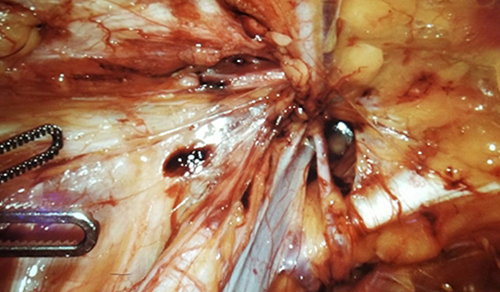Following the Genes in Cancer Prevention

Dr. Melissa K. Frey
During her residency training in obstetrics and gynecology at NewYork-Presbyterian/
Dr. Frey’s first investigation involved a survey of medical students to gauge their understanding of Lynch syndrome, an inherited disorder that increases the risk of colorectal cancers, as well as many other types of cancer, including ovarian and endometrial cancer. “Over time more students were learning about it but with an over-emphasis on colon cancer and an under-emphasis of the uterine/ovarian cancer connection,” she says.
Dr. Frey next surveyed obstetricians, gynecologists, and general surgeons and found they had knowledge about Lynch syndrome, but many did not feel comfortable counseling their patients about endometrial cancer screening. “That’s what led me to look at genetics in general,” she says. “It wasn’t just a problem with Lynch syndrome, it was a problem with genetics. The information and the data were coming out faster than could be disseminated to the practitioners.”
In her current research, Dr. Frey is seeking ways to facilitate genetic testing among providers with two ongoing prospective studies. “The first project is to figure out how we can collect a better family health history,” she says. “It is very hard for a physician to accurately document who in the family has cancer. Most of the time that is because we are asking patients questions about their personal history in the midst of a barrage of other questions. The patient might not even know if their grandparents had uterine, ovarian, or prostate cancer. Taking an accurate health history can also take a lot of time during a new patient consultation where there are a number of other areas to discuss.”
An alternative, she suggests, is to offer patients access to online tools to create their family health history. “In our study, some patients will complete a family history questionnaire in the physician’s office; others will be given an email link before the visit with access to an online portal where they can document their family health history. This gives patients time to contact family members who might have more information,” says Dr. Frey. “Hopefully, we can capture more patients who are at risk for genetic mutations and refer them for genetic testing or perform the genetic testing ourselves.”
In a related study, if a patient tests positive for a mutation, Dr. Frey wants to make this information available to other family members. “While it is useful to know that a person has a mutation because it can affect treatment and prognosis,” she says, “the most powerful part of finding a genetic mutation may be to give the patient the opportunity to inform family members that they might be at risk. We want to identify family members who haven’t developed cancer, provide them with this information, and give them the chance to get tested. If they are positive, we can offer screening and possibly preventive surgery. The hope is to prevent cancer from starting in the first place or at least identify it at an early stage.”
Patients who have a new diagnosis of a genetic mutation are given the option of having a clinical team help them identify family members and facilitate the testing if they agree. “We will mail the family members a saliva test kit that can be done at home,” says Dr. Frey. “They provide a sample in a tube and then mail it to a genetics lab. The family member can be tested without having to go to a doctor. It also takes the stress and burden off of the patient who often has just received a new diagnosis of a genetic syndrome. We’re trying to transition the burden from the patient to the medical team in a prospective fashion.”
The study recently received IRB approval and Dr. Frey hopes that by casting a wide net with testing they will identify individuals with any pathogenic mutations. “It is not specific to gynecologic oncology,” she says.
In other retrospective studies, Dr. Frey and colleagues are reviewing the results of multigene panels. “I recently looked at the experience of patients of Ashkenazi Jewish descent who underwent genetic testing to determine if we test only for the known three Ashkenazi Jewish founder mutations, what percentage of the patients will carry other mutations?” notes Dr. Frey. “In our study, we found 101 mutations in Ashkenazi Jewish patients; 80 of those were BRCA1 and BRCA2, but 21 mutations were in non-BRCA genes. What that means is that there are many other genes that are involved in cancer – even in Ashkenazi Jewish patients whose cancer, we thought, was dominated by these three known mutations. That suggests that the move towards multigene panel testing makes sense. We have to think beyond just doing BRCA1 and BRCA2 testing because the genetic landscape is so much more complex than we previously thought.”
“The most powerful part of finding a genetic mutation may be to give the patient the opportunity to inform family members that they might be at risk.”
— Dr. Melissa K. Frey
Dr. Frey believes that the need for genetic assessment is growing faster than medical geneticists or genetic counselors can keep pace. “When genetic counselors are available, that’s when the focus can be on in-depth counseling,” she says. “As physicians, however, we have to be ready to discuss genetic testing with our patients and identify those patients who are appropriate referrals for genetic counseling. It is a part of medicine that we can’t ignore, no matter what the specialty. Patients are going to start asking for this and they should be able to ask because it is a way to prevent disease, to find disease in its early stages, and to better treat known diseases.”





